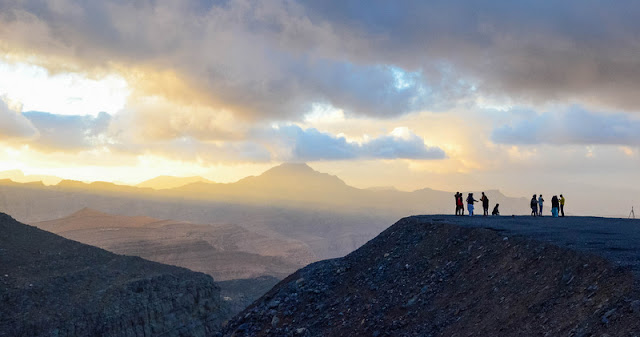This is a guest post.
Located on the northern tip of the Arabian Peninsula is a small but significant member of the United Arab Emirates (UAE) – Ras al Khaimah.
Sitting on the coast of the Persian Gulf, Ras al Khaimah has been an active trading port for millennia, tracing its origins back 7000 years. The emirate is currently ruled by Sheikh Saud bin Saqr Al Qasimi, who also sits on the Federal Supreme Council of the UAE; the region is geographically diverse, with deserts, mountain ranges, mangroves, and a coastal region.
 |
| Jebel Jais, Ras Al Khaimah |
Climate
Because it sits on the coast of the Persian Gulf, Ras al Khaimah enjoys a more moderate climate than the non-coastal emirates; however, temperatures in the summer still hit in the 100-degree range. Best times to visit are the fall, winter, and spring months, to avoid the intense heat of summer.
Ras al Khaimah has three different types of geography – mountains in the east, a coastal region in the west, and desert in the south. Ras al Khaimah borders Oman in the east and shares a mountain range with it - Ru’us Al Jibal, part of the Hajar Mountains. Ras al Khaimah boasts the highest mountain in the range, and indeed, the highest mountain in the UAE: Jebel Jais. The emirate is bordered by Saudi Arabia in the south.
The emirate is also noted for its fertile lands and its palm groves. Mangroves grow in the coastal region as well.
There are many attractions in Ras al Khaimah, ranging from action and adventure in the mountains, to water sports along the coast or relaxing in a spa. Let’s look at what’s available:
Ride the world’s longest zip line on Jebel Jais. A special harness lets you fly down the mountain at breakneck speeds halfway down. The trip is broken into two parts – you stop halfway down and transfer to a second line to get back down to the ground. A must for the truly adventurous.
Ras al Khaimah now boasts a Via Ferrata on Jebel Jais. This guided climb is led by professional instructors along a 1km route; adrenaline junkies will get their fill on this exciting tour.
The pristine coastline of Ras al Khaimah offers a variety of water sports – water skiing, jet skiing, sailing, snorkeling, or diving.
There are guided diving excursions into the waters off of Ras al Khaimah, home to one-third of the 80 known species of dolphins and whales, four known species of turtles, and over 700 species of fish.
Deep sea fishing expeditions are available if you’d like to try your hand at fishing; if being out on a boat over deep water is not your thing, you can fish in the natural creek dividing Ras al Khaimah in half, or perhaps in one of the natural lagoons.
Sailing is integral to Ras al Khaimah and has been since its inception. HH Sheik Saud bin Saqr Al Qasimi is the Patron of The Royal Yacht Club of Ras al Khaimah - a members’ club for sailing, yachting and water sports.
The deserts of Ras al Khaimah are traditionally the home of the Bedouins – the nomadic wanderers who have roamed the area since the interior of the region was settled. You can experience the Bedouin culture and lifestyle at several desert camps, or you can book a 4-wheel drive safari to explore the desert.
If none of these attractions are your particular cup of tea, stay in the city of Ras al Khaimah and enjoy what it has to offer:
Several of the hotels offer luxurious spa experiences, where you can relax and be pampered to your heart’s content.
Shopping
Visit the 5 malls located around Ras al Khaimah, where you’ll find high-end stores, restaurants, electronic stores – you name it, you’ll find it here. The malls also house ATMs, pharmacies, banks and currency exchanges.
The National Museum of Ras al Khaimah is located in the city. It contains a fascinating collection of archeological and ethnological exhibits, where you can journey from Ras al Khaimah’s beginnings up to modern times.
Ras al Khaimah is a microcosm of the UAE; it has all the adventures you can want, and it provides an example of Arab culture you shouldn’t miss. Arabs are generous and hospitable, and nowhere are these traits on display better than in Ras al Khaimah.
However – Ras al Khaimah is an Arab country, and their cultural morays and laws are different than those in the West. You need to study the laws and customs of the country before you set foot in it, to avoid breaking codes of etiquette and to avoid breaking laws. A Western woman does not have to wear a burqua, but there are dress codes she needs to know and be prepared to follow. PDAs are not allowed in the UAE, so couples need to be aware of this. Be a good guest and learn what you need to know before you go – everybody will be happier in the long run.














